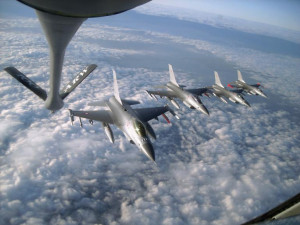
The so-called chemical attack—something that CIA itself is guilty of previously supporting and overlooking in the US manufactured gulf war—-is the latest excuse they seem to have invented to legitimize direct military intervention to prolong the war and facilitate materialization of their own sinister objectives for the region that extends far beyond Syria.
Prior to the attack, the five years of war had took us to a point, until 2 weeks ago, where the US officials were reported to have changed their policy vis-à-vis Assad. Reportedly, ‘sending Assad home’ was no longer the US agenda. The agenda, as their various statements suggested, was to pave the way for a political solution of the crisis. This, however, seems to be out of the question now as we are back to the square one with regard to the question of Assad’s future as the country’s president. The agenda of “Assad must go” is back on the table and so is the question of the role Russia, as also Iran, has played in helping Assad against the “foreign funded rebel” forces and the self-styled Islamic State.
But for Russian military presence in Syria since September 2015, Syria would have fallen. The West knows it as well as we do. Therefore, by projecting Russia as an accomplice in the pseudo gas-attack, the US has made an attempt to push back the Russian led peace process to a point where the US can reinsert itself in the conflict and keep the region embroiled in war and bloodshed.
Notwithstanding the “humanitarian face” put on Trump’s motive behind the attack, the fact remains that at least two immediate reasons stood behind the attack:
- The US’ allies, especially in the Middle East, were developing the perception of US’ indifference—and/or ineptness against the gradually increasing assertiveness of the Russia-Iran- Syrian government combine in the region.
- US’ Establishment (of course including Pentagon) appears to have felt the necessity to apply a “check” to the increasing Russian military-geopolitical muscle flexing –Ukraine/Crimea and now in Syria (and very recently inserting, albeit in low profile at this stage, in Afghanistan).
Therefore, against a subtly changing geo-political scenario in a region that was, until 2 years ago, solely under the US command, the US cannot help but put up a fight to resist the space it has lost. As such, the perception being built in the US via the mainstream media that Washington is not following a coherent policy vis-à-vis Russia is factually incorrect.
What doesn’t add up here is how can one disregard the reality that the well-proven system of proper intelligence gathering, analysis and decision making of the US Establishment can allow such “knee jerk” decision making by the US president, even if he happens to be the unpredictable Donald Trump?
On the other hand, what appears more likely and logical is that that US government does have a proper plan to apply such “checks moves” to counter Russia’s moves to expand its own geopolitical influence in certain region to checkmate that of the US.
However, what is not yet certain is whether US plans to commence its long-term intervention moves in Syria, or would US prefer to apply only the “check moves” according to the evolving situation. So far what appears more likely is that US may not prefer to intervene militarily alone in a big way in Syria because US ’public is averse to heavy causalities of their kith and kin in US military, and dontinuation of the mutual attrition of the Muslim world helps US and its allies to maintain their geopolitical superiority and enables them to profit from the war (Read: the missile strike has added a whopping US$ 5billion to the Tomahawk market).
That is to say, while the US does want to garb some of the geo-political space it has lost to Russia, it wants to do this through a limited military engagement. On the one hand, this would help the US in maintaining its erstwhile allies, such as Turkey, in its own ambit and use them against Russia/Iran, and on the other, a tussle with Russia would equally help it maintain its military and political credibility amongst its European allies who have been expressing their “reservations” with regard to Trump’s possible opening up to Russia—something that now appears to be unrealistic and an ‘out of the question’ thing!
The attack on Syria, in this context, was not a spontaneous outcome of Trump’s emotions, it was a well calculated move, a part of the US new strategy for the region, in the war that is likely to go on in the years to come. And, although missiles landed on a Syria airbase, the target was Russia and the message was loud and clear enough: the US wouldn’t allow Russia and its allies to end the war that allows the US to maintain its superior position amongst its allies as well as enemies.
Salman Rafi Sheikh, research-analyst of International Relations and Pakistan’s foreign and domestic affairs, exclusively for the online magazine “New Eastern Outlook”.
